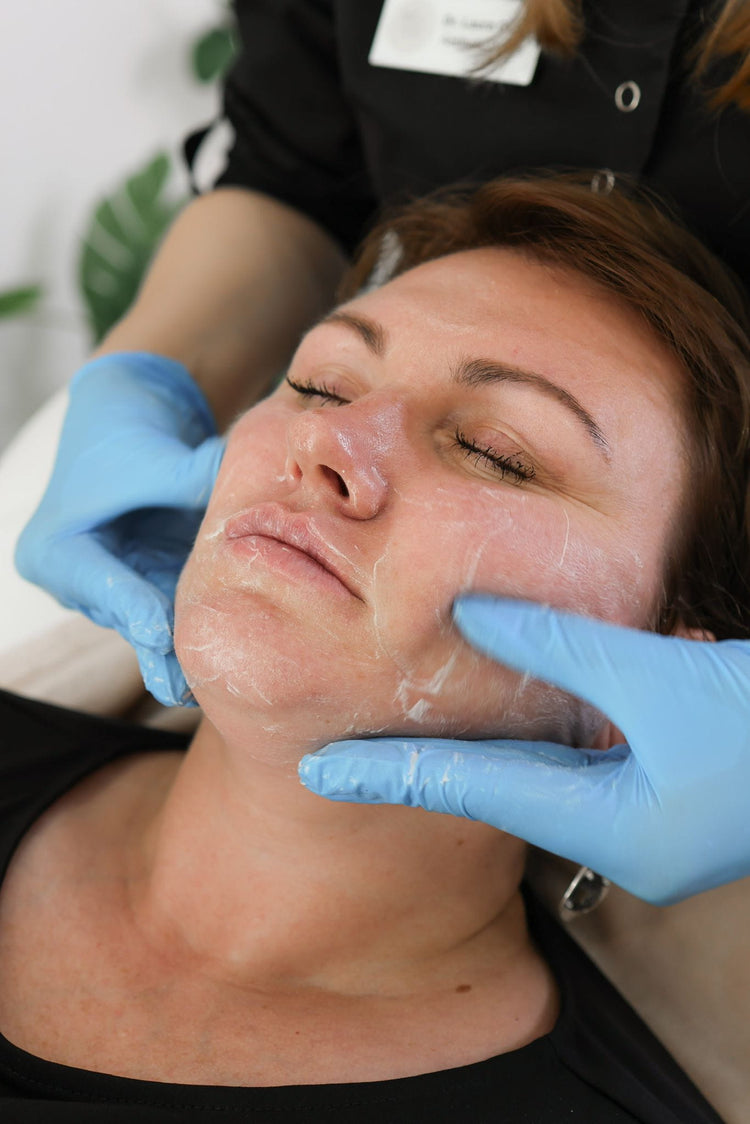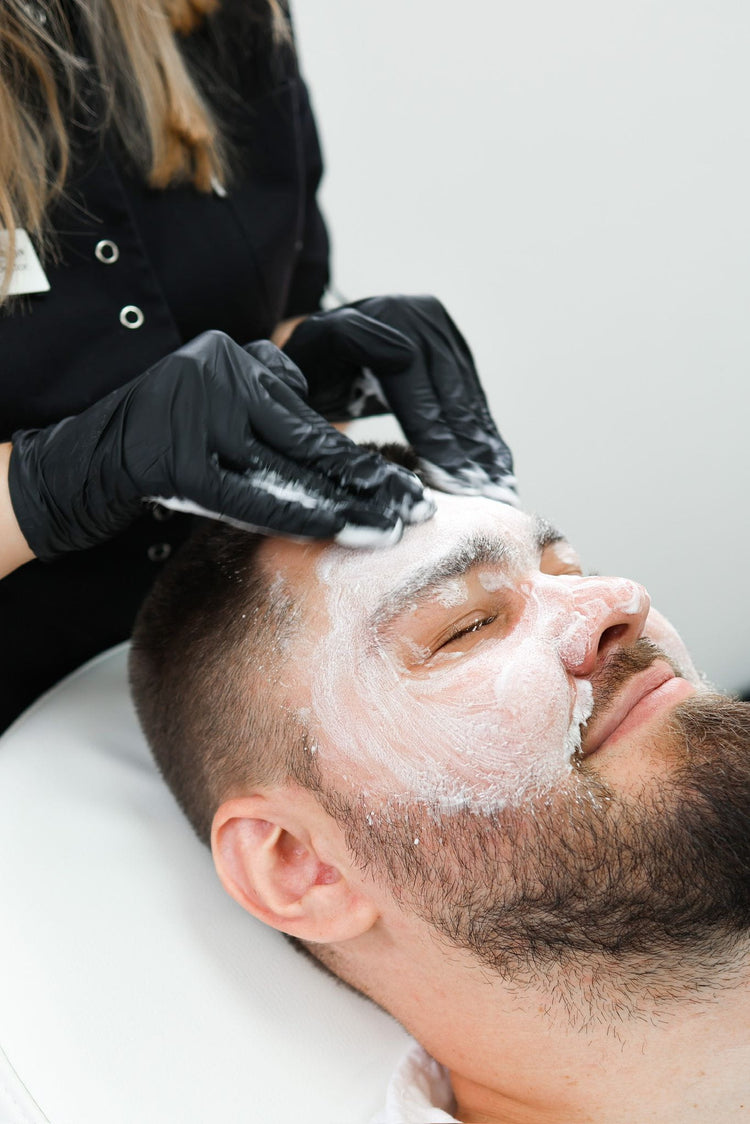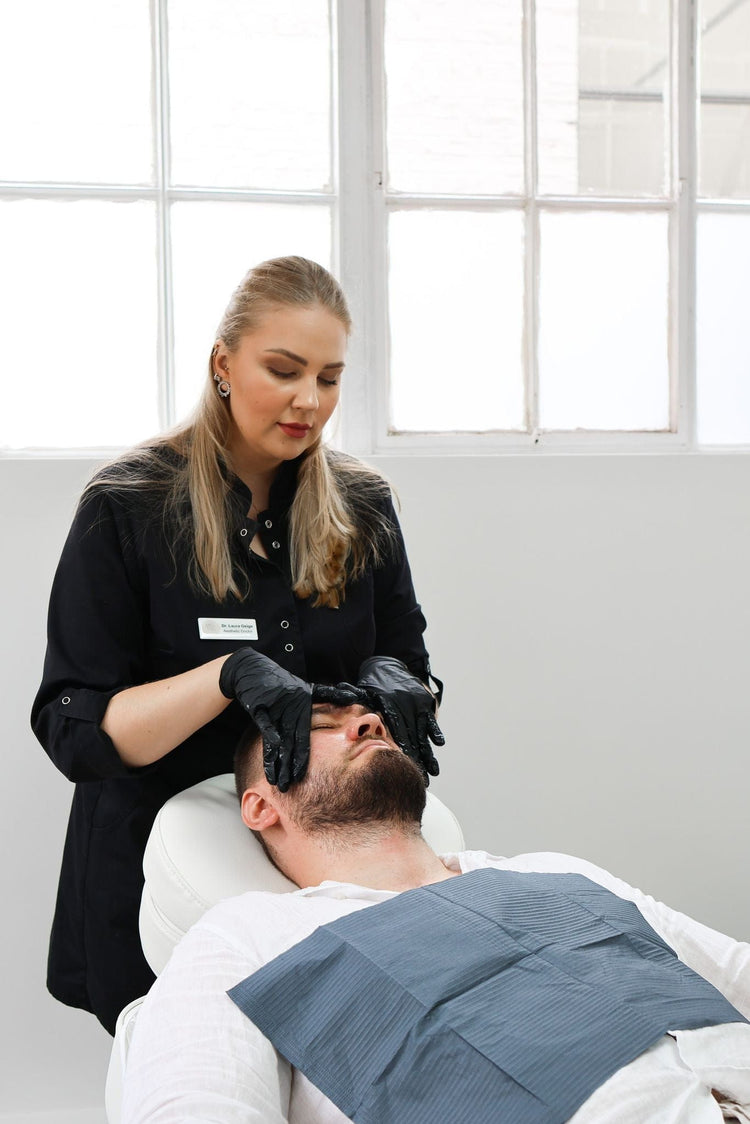Skin Type Assessment
Understanding your skin type is fundamental to achieving healthy and radiant skin. During a consultation, a skincare professional will guide you through a thorough assessment to determine whether your skin is oily, dry, combination, sensitive, or normal.
Observation
A key part of this assessment involves careful observation. Professionals look for signs like shine, texture, and any visible imperfections. Oily skin tends to be shiny, especially in the T-zone (forehead, nose, and chin), with enlarged pores and a tendency towards breakouts. Dry skin appears matte, often with flakes or rough patches. It may feel tight or sensitive.
Combination skin shows signs of both oiliness and dryness, usually with an oily T-zone and drier cheeks. Sensitive skin is characterized by redness, flushing, and reactivity to products. Normal skin exhibits a healthy balance, appearing smooth and clear.
Questioning
Understanding your skin type is fundamental to achieving healthy and radiant skin. During a consultation, a skincare professional will guide you through a thorough assessment to determine whether your skin is oily, dry, combination, sensitive, or normal.
A key part of this assessment involves careful observation. Professionals look for signs like shine, texture, and any visible imperfections. Oily skin tends to be shiny, especially in the T-zone (forehead, nose, and chin), with enlarged pores and a tendency towards breakouts. Dry skin appears matte, often with flakes or rough patches. It may feel tight or sensitive.
Combination skin shows signs of both oiliness and dryness, usually with an oily T-zone and drier cheeks. Sensitive skin is characterized by redness, flushing, and reactivity to products. Normal skin exhibits a healthy balance, appearing smooth and clear.
- To help determine your skin type, your skincare professional may ask you questions about:
- How your skin feels throughout the day
- Your typical skincare routine
- Any specific concerns or issues you’re experiencing with your skin
Understanding Skin Concerns
Understanding your skin type is crucial for building a personalized skincare routine that addresses your unique needs. During a consultation, a skincare professional will carefully assess your skin to determine whether it’s oily, dry, combination, sensitive, or normal.
Active Ingredients
Once your skin type is determined, the conversation turns to active ingredients and their roles in addressing your specific concerns. Active ingredients are the powerhouses in skincare products, targeting various issues like acne, dryness, wrinkles, and hyperpigmentation.

Some common active ingredients include:
- Hyaluronic Acid: A humectant that attracts and retains moisture, ideal for dry or dehydrated skin.
- Retinoids (Vitamin A derivatives): Promote cell turnover, reduce wrinkles, improve texture, and fight acne.
- Salicylic Acid: A beta hydroxy acid (BHA) that exfoliates the skin, unclogs pores, and reduces breakouts.
- Alpha Hydroxy Acids (AHAs): Like glycolic acid and lactic acid, they exfoliate the skin, improve texture, and brighten complexion.
- Vitamin C: A potent antioxidant that protects against sun damage, brightens skin, and promotes collagen production.
- Niacinamide: Reduces inflammation, minimizes pores, controls oil production, and improves skin barrier function.
Your skincare professional will recommend active ingredients tailored to your specific skin type and concerns. They can advise on the appropriate concentrations and formulations for safe and effective results.
Potential Reactions
Understanding your skin type is crucial for building a personalized skincare routine that addresses your unique needs. During a consultation, a skincare professional will carefully assess your skin to determine whether it’s oily, dry, combination, sensitive, or normal.
Once your skin type is determined, the conversation turns to active ingredients and their roles in addressing your specific concerns. Active ingredients are the powerhouses in skincare products, targeting various issues like acne, dryness, wrinkles, and hyperpigmentation.
Some common active ingredients include:
- Hyaluronic Acid: A humectant that attracts and retains moisture, ideal for dry or dehydrated skin.
- Retinoids (Vitamin A derivatives): Promote cell turnover, reduce wrinkles, improve texture, and fight acne.
- Salicylic Acid: A beta hydroxy acid (BHA) that exfoliates the skin, unclogs pores, and reduces breakouts.
- Alpha Hydroxy Acids (AHAs): Like glycolic acid and lactic acid, they exfoliate the skin, improve texture, and brighten complexion.
- Vitamin C: A potent antioxidant that protects against sun damage, brightens skin, and promotes collagen production.
- Niacinamide: Reduces inflammation, minimizes pores, controls oil production, and improves skin barrier function.
Your skincare professional will recommend active ingredients tailored to your specific skin type and concerns. They can advise on the appropriate concentrations and formulations for safe and effective results.
Matching Products to Your Skin Type
Knowing your skin type is essential for achieving a healthy, glowing complexion. During a consultation with a skincare expert, they’ll carefully assess your skin to determine if it’s oily, dry, combination, sensitive, or normal.
Cleansers
Understanding your skin type is crucial for choosing the right cleansers.
Oily skin benefits from cleansing gels or foaming cleansers that effectively remove excess oil without stripping natural moisture. Look for ingredients like salicylic acid to help control breakouts.
Dry skin requires gentle cleansers, often cream or oil-based formulas, that hydrate and nourish. Avoid harsh soaps or detergents that can further dry out the skin.

Combination skin calls for a balanced approach, with gentle cleansing in the drier areas (cheeks) and possibly a more potent cleanser for the oily T-zone.

Sensitive skin needs soothing, hypoallergenic cleansers that are free from fragrances and irritants.
Normal skin can generally tolerate a wider range of cleansers.
Moisturizers
Understanding your skin type is crucial for choosing the right moisturizers.
Oily skin requires lightweight, oil-free moisturizers that won’t clog pores. Look for ingredients like hyaluronic acid or glycerin to hydrate without adding excess shine.
Dry skin benefits from richer, creamier moisturizers that provide intense hydration. Ingredients like ceramides, shea butter, or squalane can help restore the skin’s barrier and lock in moisture.
Combination skin needs a balanced approach, with lighter moisturizers for the T-zone and richer creams for drier areas.
Sensitive skin requires hypoallergenic moisturizers that are free from fragrances, dyes, and potential irritants.
Normal skin can generally tolerate a wider range of moisturizers.
Serums/Treatments
Understanding your skin type is crucial for choosing the right serums and treatments. Different skin types have unique needs, and certain ingredients may be more beneficial than others.
For example, oily skin might benefit from serums with salicylic acid or niacinamide to control oil production and minimize pores. Dry skin could benefit from hyaluronic acid or ceramides to hydrate and plump the skin.
Sensitive skin often does well with gentle, fragrance-free serums formulated with soothing ingredients like aloe vera or chamomile. Combination skin might require a targeted approach, using different serums for different areas of the face.
Long-Term Skincare Strategies
Determining your unique skin type is the cornerstone of effective skincare. During a consultation, a skincare professional will meticulously analyze your complexion to classify it as oily, dry, combination, sensitive, or normal.
Lifestyle Factors
Long-term skincare success hinges on understanding your individual skin needs. Lifestyle factors play a significant role in how your skin behaves and responds to products.
Diet directly impacts your complexion. Consuming a balanced diet rich in fruits, vegetables, and antioxidants provides essential nutrients for healthy skin cells. Staying hydrated is equally crucial as water helps flush toxins and keeps skin plump.
Stress can manifest on the skin through breakouts, inflammation, or premature aging. Incorporating stress-reducing practices like yoga, meditation, or spending time in nature can promote overall well-being and improve skin health.
Adequate sleep is essential for skin regeneration and repair. Aim for 7-9 hours of quality sleep each night to allow your skin to rejuvenate.
Protecting your skin from the sun’s harmful UV rays is paramount. Wear sunscreen daily, even on cloudy days, and seek shade during peak sunlight hours to prevent sun damage, premature aging, and skin cancer.
Professional Treatments
Understanding your skin type is fundamental to achieving healthy and radiant skin. During a consultation, a skincare professional will guide you through a thorough assessment to determine whether your skin is oily, dry, combination, sensitive, or normal.
A key part of this assessment involves careful observation. Professionals look for signs like shine, texture, and any visible imperfections. Oily skin tends to be shiny, especially in the T-zone (forehead, nose, and chin), with enlarged pores and a tendency towards breakouts. Dry skin appears matte, often with flakes or rough patches. It may feel tight or sensitive.
Combination skin shows signs of both oiliness and dryness, usually with an oily T-zone and drier cheeks. Sensitive skin is characterized by redness, flushing, and reactivity to products. Normal skin exhibits a healthy balance, appearing smooth and clear.
To help determine your skin type, your skincare professional may ask you questions about:
- How your skin feels throughout the day
- Your typical skincare routine
- Any specific concerns or issues you’re experiencing with your skin
Once your skin type is determined, the conversation turns to active ingredients and their roles in addressing your specific concerns. Active ingredients are the powerhouses in skincare products, targeting various issues like acne, dryness, wrinkles, and hyperpigmentation.
Some common active ingredients include:
- Hyaluronic Acid: A humectant that attracts and retains moisture, ideal for dry or dehydrated skin.
- Retinoids (Vitamin A derivatives): Promote cell turnover, reduce wrinkles, improve texture, and fight acne.
- Salicylic Acid: A beta hydroxy acid (BHA) that exfoliates the skin, unclogs pores, and reduces breakouts.
- Alpha Hydroxy Acids (AHAs): Like glycolic acid and lactic acid, they exfoliate the skin, improve texture, and brighten complexion.
- Vitamin C: A potent antioxidant that protects against sun damage, brightens skin, and promotes collagen production.
- Niacinamide: Reduces inflammation, minimizes pores, controls oil production, and improves skin barrier function.
Your skincare professional will recommend active ingredients tailored to your specific skin type and concerns. They can advise on the appropriate concentrations and formulations for safe and effective results.
Enquire about improving your skin texture at It’s Me & You Clinic with Dr. Laura Geige
- The Best Time Of Day To Take Kratom Powder For Optimal Results - June 8, 2025
- Traptox Aka Trapezius Botox Treatment Near Weybridge, Surrey - June 7, 2025
- Skin Pen Microneedling Near Wotton, Surrey - June 6, 2025
